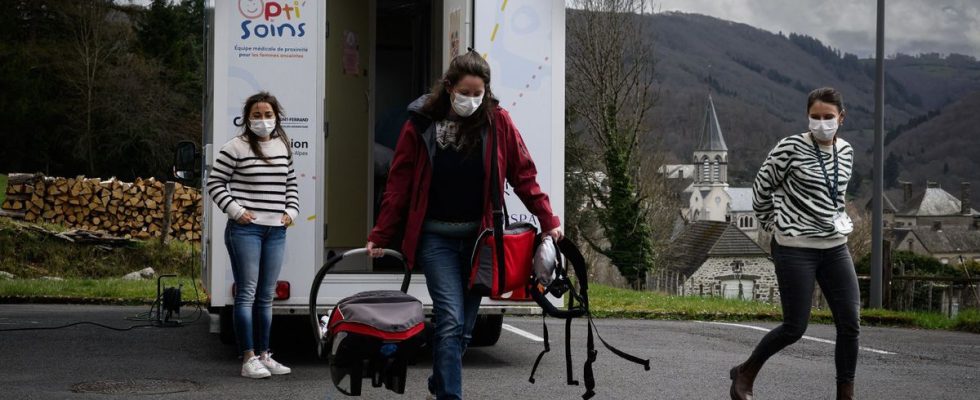Published on
Updated
Reading 3 min.
Having a child in a medical desert has become easier for around fifty women from the Auvergne countryside who benefit from complete “à la carte” follow-up thanks to a traveling truck converted into a mobile medical office.
10:30 a.m.: after crossing snowy landscapes and traveling several kilometers of winding roads, the “opti’soins” truck parks in the square of the health center of Condat, a village in Cantal.
The decor is bucolic, facing a meadow where sheep graze, not far from the bell tower of the neo-Gothic church.
This is where Marine Potet, a 32-year-old market gardener, meets for her postnatal interview. Accompanied by her one-month-old baby, she climbs into the back of the truck, greeted by midwives Nathalie Dulong and Isabelle Raimbault.
Inside, a fully equipped office: ultrasound equipment, relaxation cushion, baby scale, consultation chair.
The postnatal interview is an opportunity to “see how things have been going since the baby arrived, in the family, professional, as a couple and with the baby“, explains Nathalie Dulong.
Deployed for several years in Mayotte, this unique system in mainland France targets women geographically far from health professionals. It was deployed as part of a research project led by the Clermont-Ferrand University Hospital which made it possible to identify 400 needs in 220 municipalities, with funding from the Ministry of Health and the Auvergne-Rhône-Alpes region.
Marine Potet’s pregnancy was fully monitored in the mobile unit: ultrasounds, clinical monitoring, biological assessments, childbirth preparation courses. “What’s nice is seeing the same people, we have a closeness that develops with the midwives. At the hospital, it’s a little less personal. There, there is a link that is created“, explains the market gardener, already the mother of a three-year-old daughter.
The nearest midwife is twenty minutes away but does not perform ultrasounds, the Issoire maternity ward is an hour away. Without opti’care, “I would not have sacrificed the medical aspects, but it would have been much more restrictive“, assures the mother.
In 2021, a report from the Senate women’s rights delegation deplored that the health of the eleven million women living in rural areas is not a “priority”, medical desertification particularly affecting gynecologists, while the number of maternity wards has increased. been divided by three in forty years. This report recommended the generalization to rural departments of “traveling medicine solutions, such as equipped and multidisciplinary traveling buses or trucks“.
Some isolated patients actually experience breaks in the care pathway, underlines Isabelle Raimbault: “it is an isolated population which has a worse state of health than the general population” and “they are already having difficulties at the start of pregnancy“.
The aim of the program is therefore to “test whether bringing care as close as possible to these patients improves the health of mothers and children“.
Nutrition advice
For the second meeting of the day, head to Besse (Puy-de-Dôme), where the snow-capped peaks of the Sancy massif stand out.
Léa Burie, 27, is giving birth in two weeks. Thanks to the device, she did not have to drive thirty kilometers to Issoire for her monthly ultrasound. “We just have to cross the street to go to the truck“, welcomes the mother-to-be who came with her partner.
The team of three full-time midwives collaborates with mental health nurses and a psychiatrist who regularly call patients “during pregnancy and after, to prevent postpartum depression”: “sometimes, these are taboo things, that we don’t dare say once we have given birth“, underlines Nathalie Dulong.
Thanks to her diploma in nutrition, the midwife provides dietary advice: “we follow up much more à la carte, depending on the needs of the lady and the offer of the territory“.
The experiment must end in September. And after? “An administrative decision was taken to perpetuate the project around prevention for mothers and children“, explains Isabelle Raimbault. But “everything has to be put together and we are looking for funding“.
